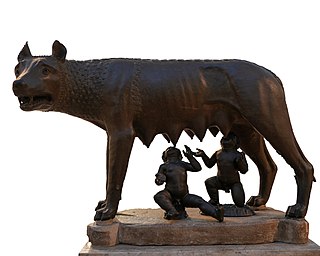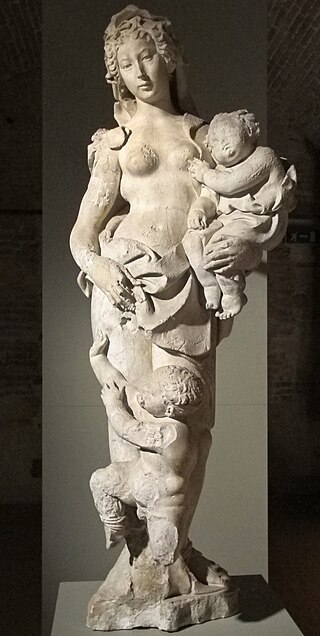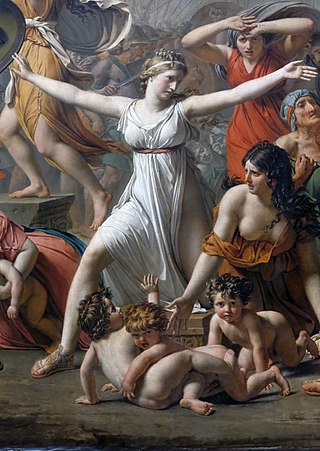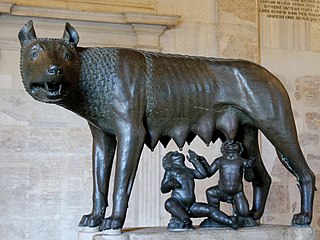Related Research Articles

Jupiter, also known as Jove, is the god of the sky and thunder, and king of the gods in ancient Roman religion and mythology. Jupiter was the chief deity of Roman state religion throughout the Republican and Imperial eras, until Christianity became the dominant religion of the Empire. In Roman mythology, he negotiates with Numa Pompilius, the second king of Rome, to establish principles of Roman religion such as offering, or sacrifice.

Vesta is the virgin goddess of the hearth, home, and family in Roman religion. She was rarely depicted in human form, and was more often represented by the fire of her temple in the Forum Romanum. Entry to her temple was permitted only to her priestesses, the Vestal Virgins. Their virginity was deemed essential to Rome's survival; if found guilty of inchastity, they were buried or entombed alive. As Vesta was considered a guardian of the Roman people, her festival, the Vestalia, was regarded as one of the most important Roman holidays. During the Vestalia privileged matrons walked barefoot through the city to the temple, where they presented food-offerings. Such was Vesta's importance to Roman religion that following the rise of Christianity, hers was one of the last non-Christian cults still active, until it was forcibly disbanded by the Christian emperor Theodosius I in AD 391.

In Roman mythology, Romulus and Remus are twin brothers whose story tells of the events that led to the founding of the city of Rome and the Roman Kingdom by Romulus, following his fratricide of Remus. The image of a she-wolf suckling the twins in their infancy has been a symbol of the city of Rome and the ancient Romans since at least the 3rd century BC. Although the tale takes place before the founding of Rome around 750 BC, the earliest known written account of the myth is from the late 3rd century BC. Possible historical bases for the story, and interpretations of its local variants, are subjects of ongoing debate.

In Greek and Roman mythology, Cacus was a fire-breathing giant and the son of Vulcan. He was killed by Hercules after terrorizing the Aventine Hill before the founding of Rome.

Acca Larentia or Acca Larentina was a mythical woman, later a goddess of fertility, in Roman mythology whose festival, the Larentalia, was celebrated on December 23.

In Roman mythology, Faustulus was the shepherd who found the infant Romulus and his twin brother Remus along the banks of the Tiber River as they were being suckled by the she-wolf, Lupa. According to legend, Faustulus carried the babies back to his sheepfold for his wife Acca Larentia to nurse them. Faustulus and Acca Larentia then raised the boys as their own. Romulus later defeated and killed King Amulius of Alba Longa, with the help of Faustulus, and his brother Pleistinus. Romulus and Remus set out to build their own city, but then had a falling out. In the ensuing skirmish, Faustulus and Pleistinus were killed. Romulus went on to found Rome

In Roman religion, Angerona or Angeronia was an old Roman goddess, whose name and functions are variously explained. She is sometimes identified with the goddess Feronia.

Numa Pompilius was the legendary second king of Rome, succeeding Romulus after a one-year interregnum. He was of Sabine origin, and many of Rome's most important religious and political institutions are attributed to him, such as the Roman calendar, Vestal Virgins, the cult of Mars, the cult of Jupiter, the cult of Romulus, and the office of pontifex maximus.

In Roman mythology, Hersilia was a figure in the foundation myth of Rome. She is credited with ending the war between Rome and the Sabines.

In Roman mythology and religion, Quirinus is an early god of the Roman state. In Augustan Rome, Quirinus was also an epithet of Janus, as Janus Quirinus.

The Ficus Ruminalis was a wild fig tree that had religious and mythological significance in ancient Rome. It stood near the small cave known as the Lupercal at the foot of the Palatine Hill and was the spot where according to tradition the floating makeshift cradle of Romulus and Remus landed on the banks of the Tiber. There they were nurtured by the she-wolf and discovered by Faustulus. The tree was sacred to Rumina, one of the birth and childhood deities, who protected breastfeeding in humans and animals. St. Augustine mentions a Jupiter Ruminus.

The Rape of the Sabine Women, also known as the Abduction of the Sabine Women or the Kidnapping of the Sabine Women, was an incident in the legendary history of Rome in which the men of Rome committed a mass abduction of young women from the other cities in the region. It has been a frequent subject of painters and sculptors, particularly since the Renaissance.

The kings of Alba Longa, or Alban kings, were a series of legendary kings of Latium, who ruled from the ancient city of Alba Longa. In the mythic tradition of ancient Rome, they fill the 400-year gap between the settlement of Aeneas in Italy and the founding of the city of Rome by Romulus. It was this line of descent to which the Julii claimed kinship. The traditional line of the Alban kings ends with Numitor, the grandfather of Romulus and Remus. One later king, Gaius Cluilius, is mentioned by Roman historians, although his relation to the original line, if any, is unknown; and after his death, a few generations after the time of Romulus, the city was destroyed by Tullus Hostilius, the third King of Rome, and its population transferred to Alba's daughter city.

Romulus was the legendary founder and first king of Rome. Various traditions attribute the establishment of many of Rome's oldest legal, political, religious, and social institutions to Romulus and his contemporaries. Although many of these traditions incorporate elements of folklore, and it is not clear to what extent a historical figure underlies the mythical Romulus, the events and institutions ascribed to him were central to the myths surrounding Rome's origins and cultural traditions.

Vulcan is the god of fire including the fire of volcanoes, deserts, metalworking and the forge in ancient Roman religion and myth. He is often depicted with a blacksmith's hammer. The Vulcanalia was the annual festival held August 23 in his honor. His Greek counterpart is Hephaestus, the god of fire and smithery. In Etruscan religion, he is identified with Sethlans.

In ancient Roman religion, the Flamen Quirinalis was the flamen or high priest of the god Quirinus. He was one of the three flamines maiores, third in order of importance after the Flamen Dialis and the Flamen Martialis. Like the other two high priests, he was subject to numerous ritual taboos, such as not being allowed to touch metal, ride a horse, or spend the night outside Rome. His wife functioned as an assistant priestess with the title Flaminicia Quirinalis.

In the Roman foundation myth, the she-wolf was an Italian wolf who nursed and sheltered the twins Romulus and Remus after they were abandoned in the wild by decree of King Amulius of Alba Longa. She cared for the infants at her den, a cave known as the Lupercal, until they were discovered by a shepherd, Faustulus. Romulus would later become the founder and first king of Rome. The image of the she-wolf suckling the twins has been a symbol of Rome since ancient times and is one of the most recognizable icons of ancient mythology.
The gens Tarutia, also found as Tarrutia, was an obscure plebeian family at ancient Rome. Few members of this gens are mentioned in Roman history, of whom the best-known is probably Lucius Tarutius Firmanus, a noted mathematician and astrologer of the first century BC.
References
- Pierre Grimal, The Dictionary of Classical Mythology Blackwell Publishing, Malden Massachusetts, 1996 page 3
- Plutarch's Life of Romulus
- St Augustine of Hippo, The City of God, Penguin Classics London 1973 page 240